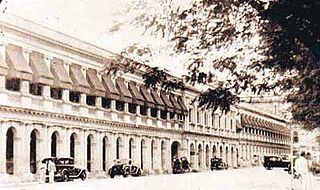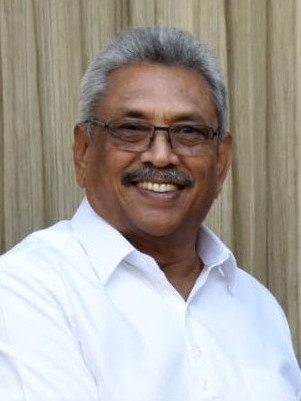Related Research Articles

The president of Sri Lanka is the head of state and head of government of the Democratic Socialist Republic of Sri Lanka. The president is the chief executive of the union government and the commander-in-chief of the Sri Lanka Armed Forces. The powers, functions and duties of prior presidential offices, in addition to their relation with the Prime minister and Government of Sri Lanka, have over time differed with the various constitutional documents since the creation of the office. The president appoints the Prime Minister of Sri Lanka who can command the confidence of the Parliament of Sri Lanka.

The Parliament of the Democratic Socialist Republic of Sri Lanka is the supreme legislative body of Sri Lanka. It alone possesses legislative supremacy and thereby ultimate power over all other political bodies in the island. It is modeled after the British Parliament. The 17th Parliament of Sri Lanka will convene for the first time on 21 November 2024.

The Supreme Court of Sri Lanka is the highest court in Sri Lanka and the final judicial instance of record. Established in 1801 and empowered to exercise its powers subject to the provisions of the Constitution of Sri Lanka, the Supreme Court has ultimate appellate jurisdiction in constitutional matters and takes precedence over all lower courts. The Sri Lankan judicial system is a complex blend of common law and civil law. In some cases, such as those involving capital punishment, the decision may be passed on to the President of Sri Lanka for clemency petitions. The current Chief Justice of Sri Lanka is Murdu Fernando.

The Constitution of the Democratic Socialist Republic of Sri Lanka has been the constitution of the island nation of Sri Lanka since its original promulgation by the National State Assembly on 7 September 1978. As of October 2022 it has been formally amended 21 times.
A president's counsel is an eminent lawyer who is appointed by the President of Sri Lanka as an individual "learned in the law". The term is an honorific that replaced the Queen's Counsel (QC), which Sri Lanka ceased appointing when it became a republic in 1972. It is equivalent to the appointment of a King's Counsel in the United Kingdom and other Commonwealth realms, and that of Senior Counsel in Commonwealth republics, bearing the same privileges, such as sitting within the Bar of court.

The Senate was the upper chamber of the parliament of Ceylon established in 1947 by the Soulbury Commission. The Senate was appointed and indirectly elected rather than directly elected. It was housed in the old Legislative Council building in Colombo Fort and met for the first time on 12 November 1947. The Senate was abolished on 2 October 1971 by the eighth amendment to the Soulbury Constitution, prior to the adoption of the new Republican Constitution of Sri Lanka on 22 May 1972. In 2010 there were proposals to reintroduce the Senate.
The chief justice of the Democratic Socialist Republic of Sri Lanka is the head of the judiciary of Sri Lanka and the Supreme Court of Sri Lanka. Established in 1801, the chief justice is one of ten Supreme Court justices; the other nine are the puisne justices of the Supreme Court of Sri Lanka. The post was created in 1801. The chief justice is nominated by the Constitutional Council, and appointed by the president. The first chief justice was Codrington Edmund Carrington. The current chief justice is Murdu Nirupa Fernando.
An Attorney at law in Sri Lanka is the only legal practitioners authorised to represent others in all court of law in the island and are also authorised to give advice regarding any matter of law. Alternative terms include lawyer.
The Parliament of Ceylon was the legislative body of British Ceylon & Dominion of Ceylon established in 1947 by the Soulbury Constitution, prior to independence on 4 February 1948. Parliament replaced the State Council of Ceylon.

Peter Mohan Maithree Peiris, PC is a Sri Lankan lawyer and diplomat. He served as the Attorney General of Sri Lanka from 2008 to 2011 and was the de facto Chief Justice of Sri Lanka from 2013 to 2015 when President Maithripala Sirisena declared his appointment void ab initio in 2015. He has been serving as the Permanent Representative of Sri Lanka to the United Nations since January 2021 and was elected Vice President of the 78th session of the United Nations General Assembly in June 2023.
Mohamed Shibly Aziz was a Sri Lankan lawyer. He served as Attorney General of Sri Lanka from 1995 to 1996 and served in the Constitution Council of Sri Lanka from 2015 to 2018.

The prime minister of Sri Lanka, officially the prime minister of the Democratic Socialist Republic of Sri Lanka is the most senior member of parliament in the cabinet of ministers. It is the second-most powerful position in Sri Lanka's executive branch behind the president, who is the constitutional chief executive. The Cabinet is collectively held accountable to parliament for their policies and actions. The powers and functions of the Prime Minister has changed several times since the creation of the office in 1947.

Shirani Bandaranayake, the 43rd Chief Justice of Sri Lanka, was impeached by Parliament and then removed from office by President Mahinda Rajapaksa in January 2013. Bandaranayake was accused of a number of charges including financial impropriety and interfering in legal cases, all of which she has denied. The impeachment followed a series of rulings against the government by the Supreme Court, including one against a bill proposed by Minister Basil Rajapaksa, President Rajapaksa's brother. Bandaranayake was replaced as chief justice by former Attorney General Mohan Peiris. Peiris is considered to be an ally of President Rajapaksa and his appointment is seen by critics as further consolidation of power by the president and his family. Bandaranayake refused to recognise the impeachment and lawyers groups refused to work with the new chief justice. Bandaranayake's controversial impeachment drew much criticism and concern from within and outside of Sri Lanka. On 28 January 2015 she was reinstated and retired on 29 January, the next day.
The Thirteenth Amendment to the Constitution of Sri Lanka (13A) is amendment to the Constitution of Sri Lanka, passed in 1987, which created Provincial Councils in Sri Lanka.
The Government of the Northern Province refers to the provincial government of the Northern Province of Sri Lanka. Under the Sri Lankan constitution the nine provincial governments of the country have power over a variety of matters including agriculture, education, health, housing, local government, planning, road transport and social services. The constitution also gives them powers over police and land but successive central governments have refused to devolve these powers to the provinces. Legislative power rests with the Northern Provincial Council whilst executive power rests with the Governor and Board of Ministers.
The 19th Amendment (19A) to the Constitution of Sri Lanka was passed by the 225-member Sri Lankan Parliament with 215 voting in favor, one against, one abstained and seven were absent, on 28 April 2015. The amendment envisages the dilution of many powers of Executive Presidency, which had been in force since 1978. It is the most revolutionary reform ever applied to the Constitution of Sri Lanka since JR Jayawardhane became the first Executive President of Sri Lanka in 1978.
Jayampathy Wickramaratne, PC is a Sri Lankan lawyer and politician. He was a national list member representing the United National Party in the Parliament. A former director of Programs of the Institute of Constitutional Studies in Colombo, he has served as a Senior Adviser to the Ministry of Constitutional Affairs and was a member of the Sri Lankan Law Commission. He entered parliament in 2015 General Election from the National List of the United National Party. He was also appointed as the Parliamentary Secretary to the Prime Minister Ranil Wickramasinghe. Wickramaratne the key person behind the proposed 2018 constitution of Sri Lanka.
The Constitutional Council (CC) is a 10-member constitutional authority in Sri Lanka tasked with maintaining independent commissions and monitoring its affairs. The Constitutional Council is aimed at depoliticizing the public service.
Dappula de LiveraPC is a Sri Lankan lawyer and the former Attorney General of Sri Lanka. He previously served as the Solicitor General of Sri Lanka from February 2018 and took over as acting attorney general from 29 April 2019 until his formal appointment in May 2019.

The fourth Gotabaya Rajapaksa cabinet, also known as the Rajapaksa-Wickremesinghe cabinet, was the central government of Sri Lanka led by President Gotabaya Rajapaksa. It was formed in May 2022 following the appointment of Ranil Wickremesinghe as the new Prime Minister and ended in July 2022 following Rajapaksa's resignation.
References
- ↑ "Eighth Amendment to the Constitution of the Democratic Socialist Republic of Sri Lanka: March 6, 1984 (Sri Lanka [lk]) LD-O 55/83". oxcon.ouplaw.com. Oxford University Press. Retrieved 12 February 2024.
